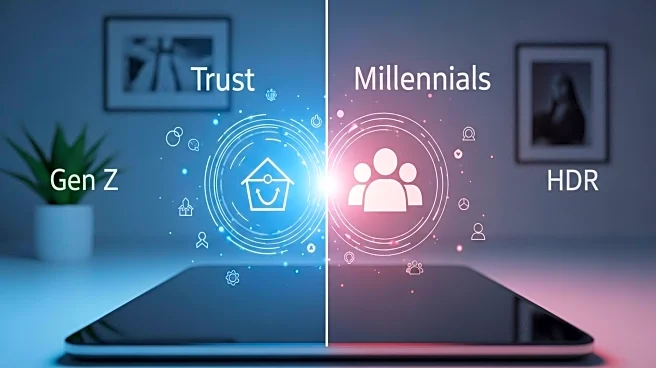What's Happening?
Marketers are increasingly recognizing the distinct differences in brand trust between Gen Z and Millennials, two key demographic groups. According to a report by Morning Consult, these generations exhibit divergent preferences and attitudes towards brands. Gen Z tends to be more skeptical of digital platforms, while Millennials are more inclined towards 'hustle culture.' This divergence is prompting marketers to reconsider their strategies and develop more tailored messaging that resonates with each group. The insights from the report highlight the importance of understanding these generational differences to effectively engage with them.
Why It's Important?
Understanding the differences in brand trust between Gen Z and Millennials is crucial for marketers aiming to optimize their strategies. As these groups represent significant consumer segments, their preferences can greatly influence market trends and brand success. By tailoring messaging to align with Gen Z's digital skepticism and Millennials' hustle culture, brands can enhance their engagement and loyalty. This approach not only helps in building trust but also in driving sales and brand advocacy. Companies that successfully navigate these generational nuances stand to gain a competitive edge in the marketplace.
What's Next?
Marketers are likely to continue refining their strategies to better cater to the distinct preferences of Gen Z and Millennials. This may involve increased investment in research and analytics to further understand these demographics. Additionally, brands might explore innovative ways to connect with Gen Z's digital skepticism, possibly through authentic and transparent communication. For Millennials, strategies that emphasize productivity and success could be more effective. As these efforts unfold, the advertising industry may witness a shift towards more personalized and generation-specific campaigns.
Beyond the Headlines
The generational divide in brand trust also raises questions about the ethical implications of marketing strategies. As brands strive to connect with Gen Z and Millennials, they must consider the authenticity and transparency of their campaigns. This focus on ethical marketing could lead to long-term shifts in industry standards, promoting more responsible and consumer-centric practices. Furthermore, the emphasis on understanding generational differences may drive innovation in market research methodologies, enhancing the ability to predict and respond to consumer behavior.









